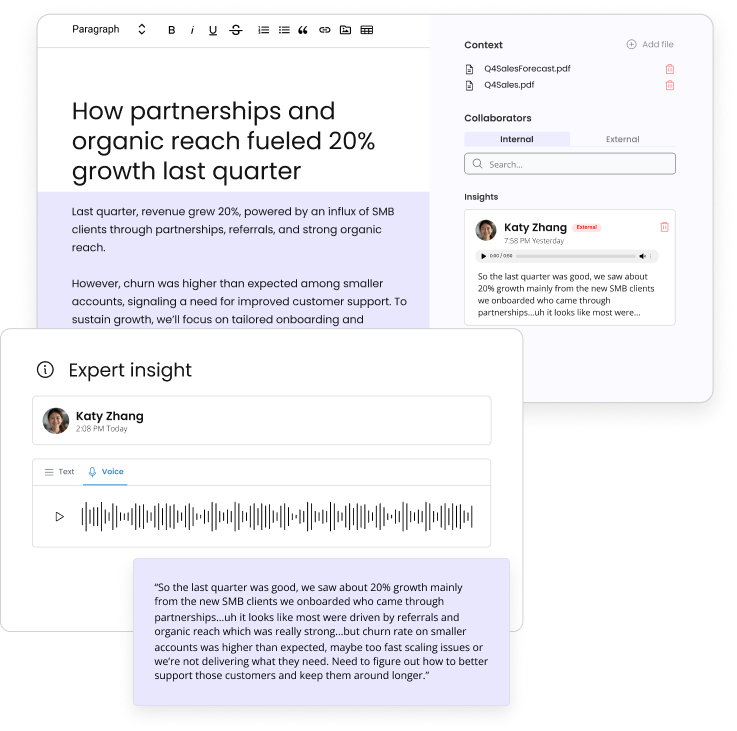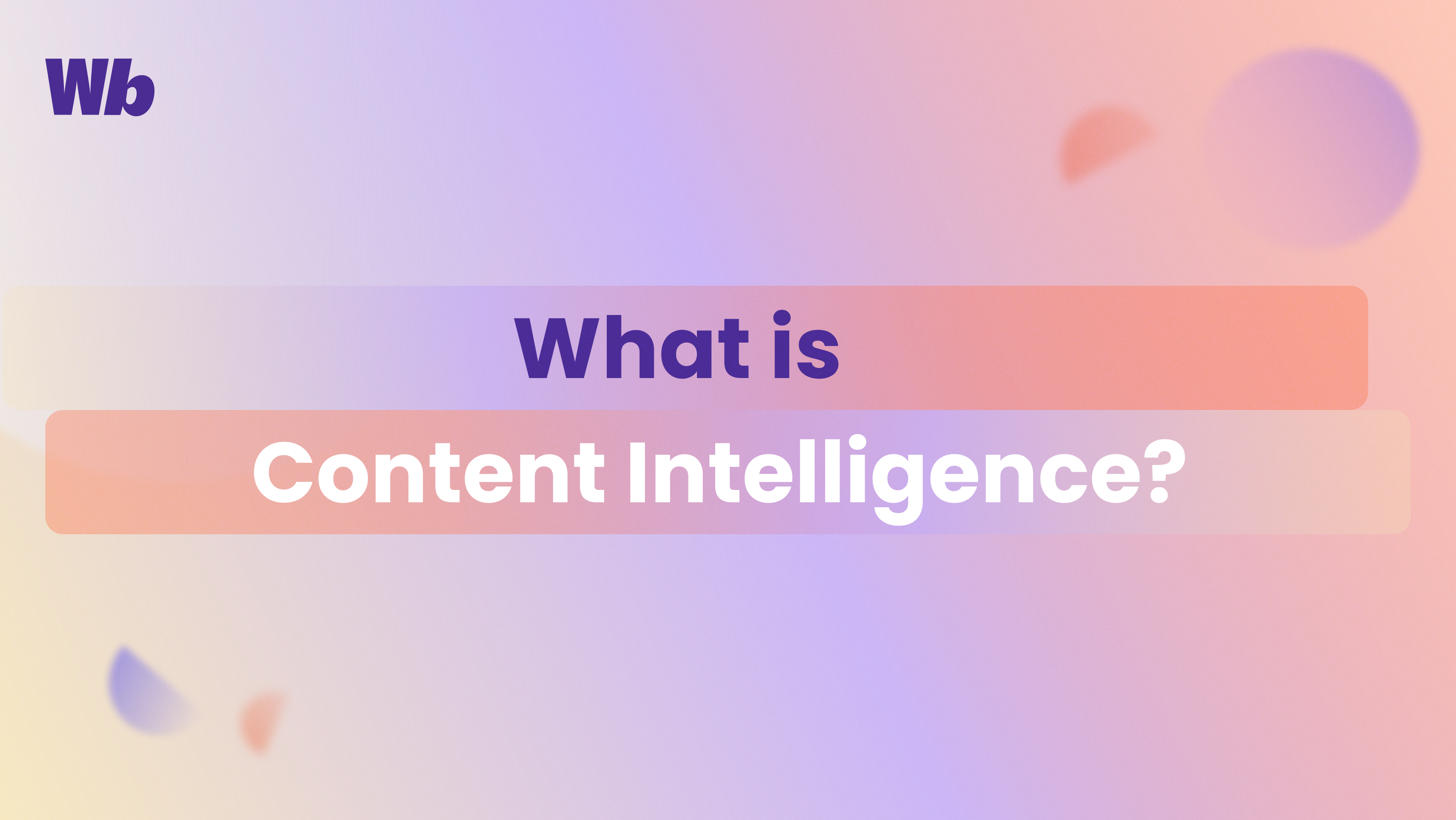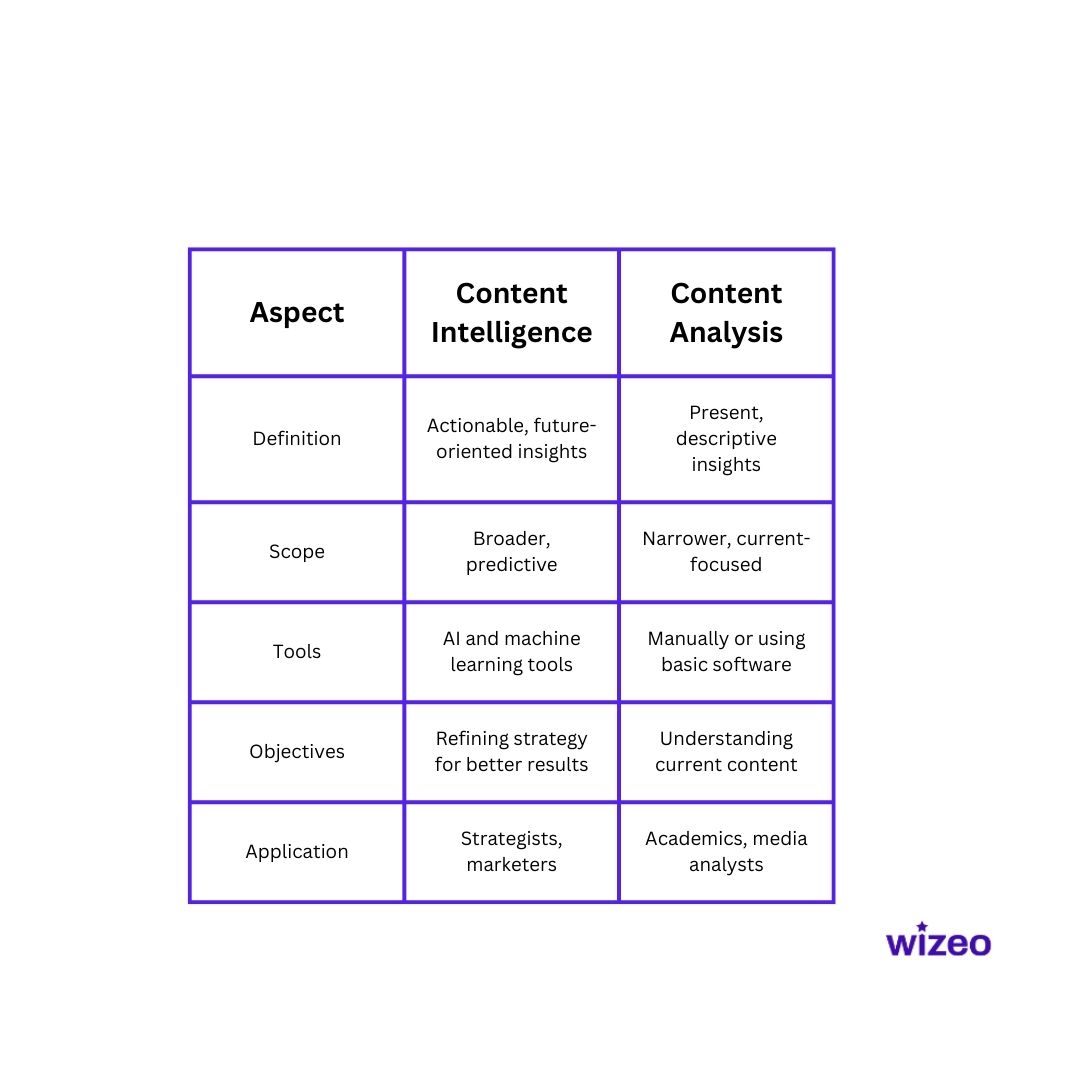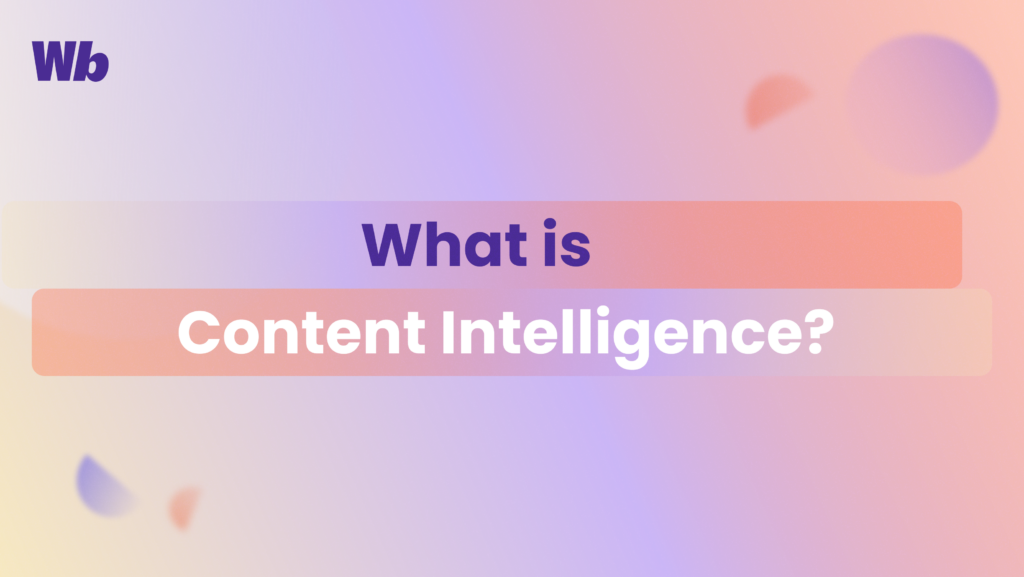Table of Contents

Authority scales when expertise comes first
Wordbrew helps teams collect expert insight before AI ever writes a word.
Built for expert-led, review-safe content
- Home
- »
- Content Marketing
- »
- What is content intelligence and how can businesses leverage it?
-
Anna Louise
- 8 minutes read time
What is content intelligence and how can businesses leverage it?
- Home
- »
- Content Marketing
- »
- What is content intelligence and how can businesses leverage it?
What is content intelligence and how can businesses leverage it?
Table of Contents

Content intelligence, put simply, is the integration of artificial intelligence (AI) and machine learning with content strategy and analysis. If you’ve been dubious about AI’s potential, ditch all preconceptions and get on board—because this is a revolution in content marketing.
Advanced technologies have enabled marketers to move beyond intuition and basic analytics, towards smarter, data-driven strategies. Content intelligence can help you understand content performance, website trends, competitors, and audience interactions in more sophisticated ways than ever before.
What is content intelligence?
Content intelligence is the process of using AI and software to gauge the effectiveness of your content and how your audience responds to it.
In modern marketing, it’s critical to understand that content intelligence is predominantly a data-driven approach. This doesn’t mean just glancing at numbers and graphs; it involves rigorous analysis to truly gauge the efficacy of content.
With AI-powered content intelligence tools, businesses can now monitor how targeted audiences respond to their content. We’re talking granular data here—cutting out trial and error to build strategies that are more effective from the get-go. These insights can provide the ‘whys’ as well as the answers to important questions, such as:
Are they engaging with the content?
Are they sharing it?
Are they ignoring it?
These tools also enable marketers to discern vital content trends, helping them identify the voice, tone, and style that resonate most profoundly with their audience, and to adapt and evolve when their material is no longer landing as it should.
For instance, a brand might find through predictive analytics that its audience gravitates more toward informative videos than text-heavy blogs. This insight can significantly change their content strategy, shifting focus and resources to video content creation.
Why is content intelligence important?
Content intelligence plays a crucial role in aligning content strategies with the ever-evolving needs of the audience. With the oversaturation of content on the internet, ensuring that your company stands out and speaks directly to your audience’s needs is an essential factor for success.
Additionally, by providing data-driven insights, content intelligence enhances decision-making processes, especially in content creation and promotion. For example, if market research indicates a growing interest in a specific topic within your industry, that would send a clear message to focus on creating content around that theme.
But beyond creation and strategy, there’s also the ROI (Return on Investment) to consider. Businesses invest significantly in content marketing efforts. Understanding the return on that investment through performance metrics and audience feedback, achieved via content intelligence, is vital to justify and optimize those investments.
As digital trends continuously evolve, staying relevant is key—what worked a year ago might not work today. Content intelligence ensures you’re not just keeping pace with the changes, but staying ahead of them.
What’s the difference between content intelligence and content analysis?
Content intelligence and content analysis both evaluate content but differ in methods and objectives. Here’s a detailed breakdown:
Definition:
- Content intelligence: Leveraging AI and machine learning with content data for actionable insights, emphasizing an enhanced content strategy.
- Content analysis: A systematic study of textual, visual, or multimedia content, spanning both qualitative (themes, tone) and quantitative (word frequency) aspects.
Scope:
- Content intelligence: Offers predictive analytics, personalization, and forward-thinking recommendations.
- Content analysis: Zooms in on current content attributes rather than prospective strategies.
Tools & techniques:
- Content intelligence: Utilizes AI-powered tools for analyzing content, and audience behavior, and suggesting optimization or automation.
- Content analysis: Ranges from manual assessments by researchers to software-assisted content categorization.
Objective:
- Content intelligence: Aims to refine content strategy with insights, trend predictions, and actionable advice.
- Content analysis: Focuses on understanding the content’s inherent themes and patterns.
Application:
- Content intelligence: Favoured by content marketers for better reach, engagement, and conversion, considering user interactions.
- Content analysis: Used broadly in fields like media studies to understand patterns and trends without a direct marketing focus.
In short, content analysis dives into content’s core traits, while content intelligence, powered by AI, gives deeper insights and strategy-focused recommendations.

Use cases and benefits of content intelligence platforms for small and medium businesses
Content intelligence, driven by AI and natural language processing, offers small and medium businesses a dynamic toolkit to amplify their content strategy. Let’s unpack its practical applications:
- Gain insights: Beyond mere clicks, businesses can discern which content genuinely connects. For example, a spike in engagement might indicate a particular topic’s resonance or a certain style’s appeal.
- Advanced content analysis: By assessing style, tone, and quality, these platforms can guide businesses on brand voice. Want to be an industry authority? Perhaps a formal tone with comprehensive research is your go-to. Looking to build a personal bond? A conversational tone might be in order.
- Automating the content lifecycle: Say goodbye to manual grunt work. Platforms might hint at trending topics that competitors are exploring but you’ve missed. This automation extends from ideation to content distribution, streamlining consistency and saving precious time.
- Optimized content management: Integration with CMS platforms ensures your content is both accurate and current, fortifying its potency over time.
- Audience identification: Dive deeper than demographics. Unearth the nuances of your ideal customer’s preferences and behaviors and find the right audience for a finely-tuned approach.
- Unpacking content performance: As well as tracking performance, you need an understanding of the intricate ‘whys’ behind it. Delve into the catalysts: was it the content format, promotional methods, or an external factor?
- SEO mastery: Grasp what your audience seeks, tailoring content and keywords that not only answer their queries but also stand out in search results.
- Personalized user experience: Elevate the engagement of users by delivering personalized content that feels tailor-made, all by tapping into historical interactions and inclinations.
- Competitive analysis: Discover what methods the masters in your niche are using. Some of the lessons learned from competitor data, adapted to your content, could work wonders for your strategy.
In essence, content intelligence empowers small and medium businesses to fine-tune and automate processes, and upgrade their content strategy, driving meaningful engagement and tangible results.
Wordbrew’s hybrid content creation platform, the first of its kind, takes content intelligence to another level of sophistication by training its language model on your existing content, so all output remains on-brand. This ensures you get results that are not only smart but also original and authentic to your company’s voice.
Additionally, while leveraging AI in your content strategy can give you an edge, some marketers worry about how search engines like Google perceive AI-generated content. Knowing how to deal with this concern can make a substantial difference in your ROI. Wordbrew can deliver content that is primed to rank and never generic.
How can you choose the right content intelligence platform?
Picking the right platform for content intelligence isn’t a decision to be made lightly—it’s foundational to your content strategy’s success. Here’s how you make an informed choice:
Carefully consider your business needs
Begin by examining what you’re trying to achieve. Are you aiming to boost engagement, increase conversion rates, or perhaps, unearth user insights? Let’s say you’re battling high bounce rates; you might prioritize a platform that excels in user experience analytics. Your goals and current pain points will shape the key features you need.
Mind your budget, but seek value for your content marketing efforts
In addition to keeping track of the numbers, consider where you get the most value. For instance, if you’re a startup with limited funds, you might consider platforms offering essential features now and scalability for the future. Always weigh the platform’s offerings against its cost to ensure a sound return on investment.
Seamless data integration is key
Your chosen platform shouldn’t just sit beside your existing systems—it should meld with them. If you’re already using tools like Google Analytics or CRM systems, the new platform should integrate effortlessly, pulling data to offer insights that drive action. For example, integrating with CRM might reveal the content preferences of your highest-value customers, guiding your strategy.
Equip your team
It’s not enough to have a powerful tool; you need skilled hands wielding it. Assess your team’s current capabilities. If there’s a learning curve, is there accessible training? Perhaps the platform you’re eyeing has an intuitive interface, or maybe they offer comprehensive onboarding sessions. Ensure that whatever you choose, your team stands ready to maximize its potential.
Remember, the right content intelligence platform fits your needs, impresses your customers, and amplifies your content strategy’s impact. Choose wisely, and watch your content thrive!
Popular content intelligence tools
Choosing content intelligence platforms among many strong contenders can be challenging. It’s essential to find one that aligns with your specific needs, whether that’s a focus on SEO, analytics, or brand monitoring.
Here are some reputable tools in the field:

SEMRush: This tool offers a comprehensive view of your industry’s content landscape and user behaviors. If SEO is a priority for your strategy, SEMRush is worth considering.
HubSpot: Known for its emphasis on inbound marketing, HubSpot’s Content Assistant tool aids in the content creation process and optimization. It’s a solid choice if you’re aiming to enhance your content’s effectiveness with a straightforward approach.
Curata: For those who need help managing vast amounts of web content, Curata can help identify and curate relevant content that aligns with your brand and target audience.
Brandwatch: Monitoring your brand’s online reputation is easier with Brandwatch. It provides insights into social mentions and sentiment analysis, helping you maintain a positive digital presence.
BuzzSumo: If staying updated on social media trends is vital for your strategy, BuzzSumo offers analytics on current popular topics, which can be useful for refining your social media approach.
When selecting a tool, ensure it aligns with your business objectives and budget. Don’t be afraid to test the waters and avail of demos and trials before making final investments—the right choices will save you time and money in the long run.
The power of content intelligence systems
High-profile brands have been harnessing the potential of content intelligence for years. Let’s explore how some industry leaders have used insights from analysis to connect more deeply with their audiences and achieve notable results.
Netflix: This streaming giant is a masterclass in content intelligence. By meticulously analyzing viewer habits, preferences, and search patterns, Netflix practically predicts their next show. This data-driven approach led to tailored content production like House of Cards, which became a massive hit. The result? Their subscriber base surged by over 25% in a single year, proving that content crafted by intelligence isn’t just appealing; it’s addictive.
In a recent talk, Fonz Morris, Lead Product Designer, Global Conversion and Monetization at Netflix also revealed how Netflix analyzed how their content was affecting user experience. Just by using data to change one video that appears on the signup page for Netflix, the streaming giant is expected to reel in over $30 million in incremental revenue.
Airbnb: Airbnb cleverly captured its audience by becoming storytellers. Using content intelligence, they uncovered the deepest desire of their visitors: authentic travel experiences. This led to the birth of “Airbnb Experiences,” a curated selection of activities hosted by locals. By tailoring website content to user behavior and preferences, Airbnb reported a whopping 7x year-over-year growth rate for their Experiences segment within two years post-launch.
Nike: By leveraging content intelligence, Nike concentrated their marketing campaigns on telling compelling athlete stories. Tracking user engagement, they noticed a spike in interest whenever content was aspirational, motivating, and story-driven. Their digital sales skyrocketed by 30% in a quarter, underscoring the power of content that inspires.
In each of these cases, content intelligence revolutionized brand strategy. Whether it’s predicting the next binge trend, crafting immersive travel tales, or narrating athletic triumphs, when content meets intelligence, the narrative captures hearts.
The future is intelligent—shape your content now
Content intelligence has cleared the path to unparalleled engagement and ROI. As businesses awaken to the strength of data-backed strategies, the necessity of evolved intelligence tools only amplifies. And with the rapid advancements of machine learning, we’re entering a new world of profound insights and automation possibilities.
The confluence of AI, actionable data, and creativity isn’t a trend; it’s a mandate. Ready to forge ahead with foresight? Step into the future with Wordbrew, your trusted partner for hybrid content creation.
